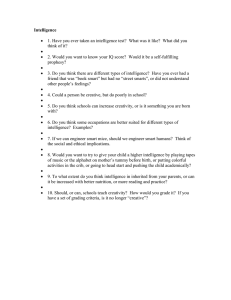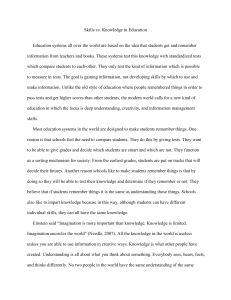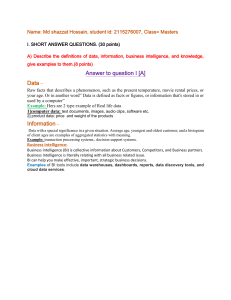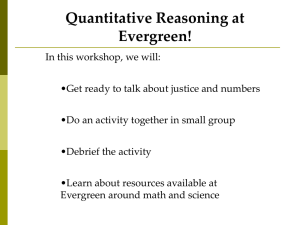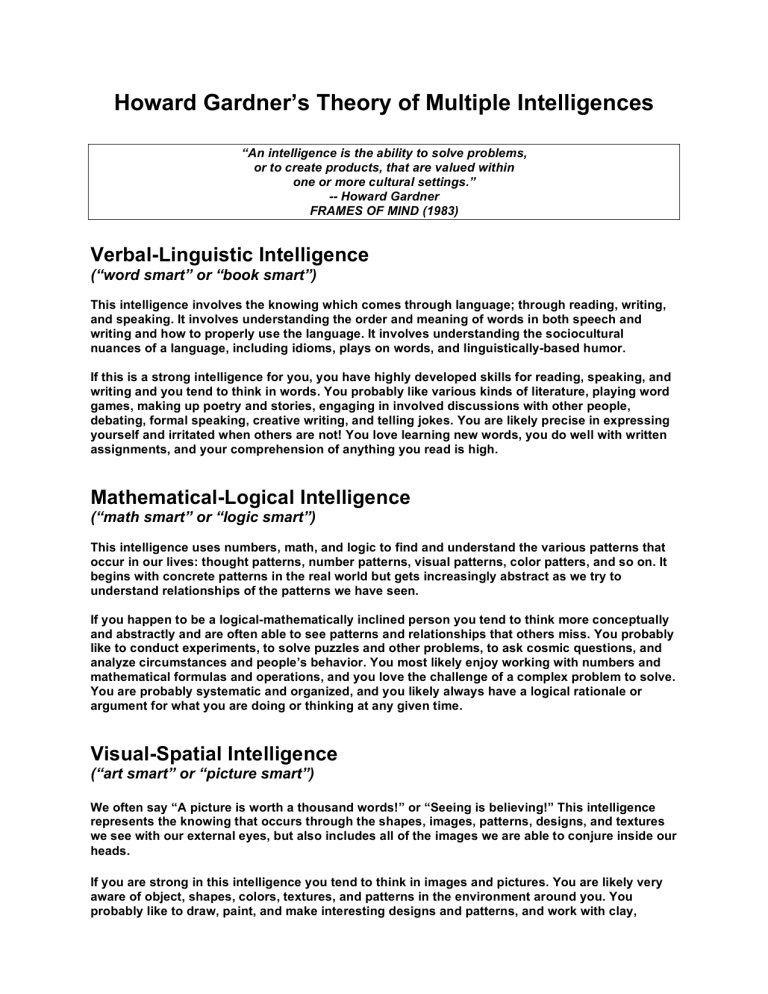
Howard Gardner’s Theory of Multiple Intelligences “An intelligence is the ability to solve problems, or to create products, that are valued within one or more cultural settings.” -- Howard Gardner FRAMES OF MIND (1983) Verbal-Linguistic Intelligence (“word smart” or “book smart”) This intelligence involves the knowing which comes through language; through reading, writing, and speaking. It involves understanding the order and meaning of words in both speech and writing and how to properly use the language. It involves understanding the sociocultural nuances of a language, including idioms, plays on words, and linguistically-based humor. If this is a strong intelligence for you, you have highly developed skills for reading, speaking, and writing and you tend to think in words. You probably like various kinds of literature, playing word games, making up poetry and stories, engaging in involved discussions with other people, debating, formal speaking, creative writing, and telling jokes. You are likely precise in expressing yourself and irritated when others are not! You love learning new words, you do well with written assignments, and your comprehension of anything you read is high. Mathematical-Logical Intelligence (“math smart” or “logic smart”) This intelligence uses numbers, math, and logic to find and understand the various patterns that occur in our lives: thought patterns, number patterns, visual patterns, color patters, and so on. It begins with concrete patterns in the real world but gets increasingly abstract as we try to understand relationships of the patterns we have seen. If you happen to be a logical-mathematically inclined person you tend to think more conceptually and abstractly and are often able to see patterns and relationships that others miss. You probably like to conduct experiments, to solve puzzles and other problems, to ask cosmic questions, and analyze circumstances and people’s behavior. You most likely enjoy working with numbers and mathematical formulas and operations, and you love the challenge of a complex problem to solve. You are probably systematic and organized, and you likely always have a logical rationale or argument for what you are doing or thinking at any given time. Visual-Spatial Intelligence (“art smart” or “picture smart”) We often say “A picture is worth a thousand words!” or “Seeing is believing!” This intelligence represents the knowing that occurs through the shapes, images, patterns, designs, and textures we see with our external eyes, but also includes all of the images we are able to conjure inside our heads. If you are strong in this intelligence you tend to think in images and pictures. You are likely very aware of object, shapes, colors, textures, and patterns in the environment around you. You probably like to draw, paint, and make interesting designs and patterns, and work with clay, colored markers, construction paper, and fabric. Many who are strong in visual-spatial intelligence love to work jigsaw puzzles, read maps and find their way around new places. You probably have definite opinions about colors that go together well, textures that are appropriate and pleasing, and how a room should be decorated. And, you are likely excellent at performing tasks that require “seeing with the mind’s eyes,” such as visualizing, pretending, imagining, and forming mental images. Intrapersonal Intelligence (“self smart” or “introspection smart”) “self smart” or “introspection smart”). At the heart of this intelligence are our human selfreflective abilities by which we can step outside of ourselves and think about our own lives. This is the introspective intelligence. It involves our uniquely human propensity to want to know the meaning, purpose, and significance of things. It involves our awareness of the inner world of the self, emotions, values, beliefs, and our various quests for genuine spirituality. If this intelligence is one of your strong points you may like to work alone and sometimes you may shy away from others. You are probably self-reflective and self-aware and thus you tend to be in tune with your inner feelings, values, beliefs, and thinking processes. You are frequently bearers of creative wisdom and insight, are highly intuitive, and you are inwardly motivated rather than needing external rewards to keep you going. You are often strong willed, self-confident, and have definite, well-thought out opinions on almost any issue. Other people will often come to you for advice and counsel. Bodily-Kinesthetic Intelligence ("body smart" or "movement smart") We often talk about “learning by doing.” This way of knowing happens through physical movement and through the knowing of our physical body. The body “knows” many things that are not necessarily known by the conscious, logical mind, such as how to ride a bike, how to parallel park a car, dance the waltz, catch a thrown object, maintain balance while walking, and where the keys are on a computer keyboard. If you have strength in this intelligence area you tend to have a keen sense of body awareness. You like physical movement, dancing, making and inventing things with your hands, and roleplaying. You probably communicate well through body language and other physical gestures. You can often perform a task much better after seeing someone else do it first and then mimicking their actions. You probably like physical games of all kinds and you like to demonstrate how to do something for someone else. You may find it difficult to sit still for long periods of time and are easily bored or distracted if you are not actively involved in what is going on around you. Interpersonal (“people smart” or “group smart”) This is the person-to-person way of knowing. It is the knowing that happens when we work with and relate to other people, often as part of a team. This way of knowing also asks use to develop a whole range of social skills that are needed for effective person-to-person communication and relating. If this person-to-person way of knowing is more developed in you, you learn through personal interactions. You probably have lots of friends, show a great deal of empathy for other people and exhibit a deep understanding of other points of view. You probably love team activities of all kinds and are a good team member--you “pull your own weight” and often much more! You are sensitive to other people’s feelings and ideas, and are good at piggybacking your ideas on others’ thoughts. And you are likely skilled at drawing others out in a discussion. You are also probably skilled in conflict resolution, mediation, and finding compromise when people are in radical opposition to each other. 2 Naturalist Intelligence (“nature smart” or “environment smart”) The naturalist intelligence involves the full range of knowing that occurs in and through our encounters with the natural world including our recognition, appreciation, and understanding of the natural environment. It involves such capacities as species discernment, communion with the natural world and its phenomena, and the ability to recognize and classify various flora and fauna. If the naturalist intelligence is one of your strengths you have a profound love for the outdoors, animals, plants, and almost any natural object. You are probably fascinated by and noticeably affected by such things as the weather, changing leaves in the fall, the sound of the wind, the warm sun or lack thereof, or an insect in the room. At a young age you were likely nature collectors, adding such things as bugs, rocks leaves, seashells, sticks, and so on to your collections. You probably brought home all manner and kinds of stray animals and today you may have several pets and want more. You tend to have an affinity with and respect for all living beings. Musical-Rhythmic Intelligence (“music smart” or “sound smart”) This is the knowing that happens through sound and vibration. In the original research on the theory of multiple intelligences this intelligence was called musical-rhythmic intelligence. However, it is not limited to music and rhythm so I’m calling it auditory-vibrational, for it deals with the whole realm of sound, tones, beats, and vibrational patterns as well as music. If you are strong in this intelligence area you likely have a love of music and rhythmic patterns. You are probably very sensitive to sounds in the environment; the chirp of cricket, rain on the roof, varying traffic patterns. You may study and work better with music in the background. You can often reproduce a melody or rhythmic pattern after hearing it only once. Various sounds, tones, and rhythms may have a visible effect on you--others can often see a change in facial expressions, body movement, or emotional responses. You probably like to create music and you enjoy listening to a wide variety of music. You may be skilled at mimicking sounds, language accents, and others’ speech patterns, and you can probably readily recognize different musical instruments in a composition. Adapted from various sources including: http://www.multi-intell.com/MI_chart.html 3

